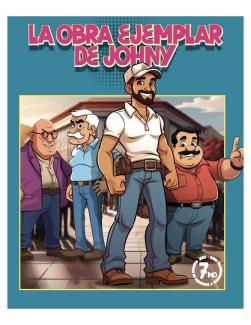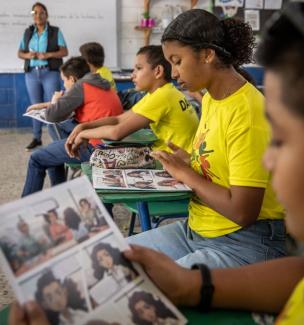Every December, the world marks International Anti-Corruption Day to spotlight challenges in addressing corruption as a global community. Corruption weakens the pillars of democracy, hinders economic progress, and leads to instability in government. In the heart of Honduras, local partners and young people are instrumental to advancing democratic values and reinforcing access to public services and other institutions.
Many of the complex issues facing Honduras, such as crime, corruption, and lack of opportunities, directly impact young people. Civic education and dialogue provide the space to confront these issues in a tangible way. OTI’s Central America Regional Initiative (CARI) partners with local community-based organizations, and NGO's to strengthen transparency and accountability practices within educational institutions.
In the cities of Tegucigalpa and San Pedro Sula, OTI-supported partners work hand-in-hand with communities to prevent corruption through education reform and civic engagement. Educating young people on what corruption looks like, and what transparency, accountability, and building honest relationships means, is critical to preventing it. Focusing on this, CARI designed innovative exercises, including civically-themed comic books and the formation and sponsorship of student government groups, to engage young people to confront corruption.
OTI’s work to strengthen and grow student governments helped them become more dynamic and inclusive platforms. OTI, in partnership with Asociación Cristiana de Jóvenes de Honduras (ACJ) developed an interactive learning experience and implemented it in the communities of El Pedregal, San Miguel, and Los Pinos to train students and teachers on democratic voting systems and how to practice active citizenship. Once the student body elects their government representatives, ACJ will analyze and fund select student government plans to organize athletic and artistic activities in their communities. Student government exercises like this provide a place for young voices to be heard, and to bolster discussions around what it means to be an engaged and ethical citizen.
For many of the students, it is not just a personal journey; it is a catalyst for engaging their peers to learn more about transparency. “A united community, where us students can set an example, becomes stronger together,” said Lizzie, a tenth grade student and member of her student government in Tegucigalpa.
OTI also worked in collaboration with local partners to address transparency by creating a non-traditional teaching tool: a set of comic books designed for seventh, eighth, and ninth-grade students. The comic books promote civic responsibility by incorporating themes such as honesty, ethics, and empathy. OTI worked with two schools in the Chamelecón sector of San Pedro Sula to integrate the comic books into the civic education curriculum. As a result, students now learn about these topics from a medium that is age-appropriate and easy to understand. Educators are also onboard, as one teacher at the Perfecto Bobadilla Basic Education Center in San Pedro Sula shared, “I see in this material an opportunity to teach students topics that will help them at school, at home, and with their friends to know how to act correctly and honestly.”
The four comic book stories introduce concepts around corruption and how to confront it by having the main characters face it through real-life, recognizable examples. For example, one comic book addresses corrupt practices in classrooms and educational centers, like helping others cheat, that can sometimes become normalized. The story then introduces messages about how embracing honesty and empathy can help change perceptions around those norms and generate personal growth. Another comic book covers issues of corruption outside of the classroom by telling the story of Johny, a builder in charge of remodeling his town market. He faces a conflict with his uncle when he finds out he is involved in corrupt business practices with the mayor. Johny deals with pressure and doubts, but ultimately decides to follow his principles and confront the established political system. This story is a useful tool because it presents the problem of corruption in municipal institutions and shows how to encourage accountability.
Due to the comic books’ popularity, positive reception, and support from school authorities, OTI’s partners expanded this transparency-focused initiative to reach more schools, prioritizing four in Tegucigalpa and ten more in San Pedro Sula. Local partners will continue to share and incorporate the comics into curriculums next year. With these investments, from student government training to comic book teaching aids, OTI’s partners are pushing back on corruption and encouraging young people to pave the way for a more transparent and accountable society.

OTI/CARI

Jim Huylebroek

